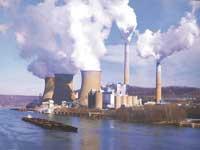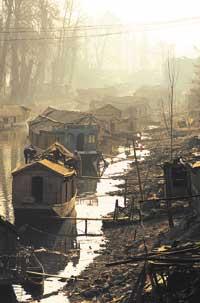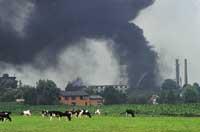Abel González: "Governments have not explained that they have sufficient responsibility to use nuclear energy"

In the latter, nuclear energy is again in full swing and there are great controversies in this regard, among which is the long survival of radioactive waste of nuclear power plants, which represents a potential and multi-year risk.
The survival of waste from nuclear power plants is not greater than that of waste from coal burning power plants. In fact, the ashes that remain after burning coal contain radioactive waste of very long life. One of the components of coal is radio, a very radioactive material. However, it is known that coal burning plants are more radioactive than nuclear ones. The problem of nuclear weapons is accidents. On the other hand, the gases released by burning coal cause, among other things, acid rain, which also has serious consequences for nature.
So, do you think nuclear power plants are necessary?
I am not a great defender of nuclear energy. My job is to protect people from radiation. But I don't like hypocrisy, and I think there's a lot of hypocrisy in all this. On the one hand, on the part of the politicians and on the other, on the part of the people.

I think the questions we have to ask are three. First: Do we want energy, yes or no?. It can be lived without energy, because when I was small we used kerosene bluff to learn and to protect us from cold blankets. Now I am very pleased that my children learn with good light. I am pleased by those who “fight” for the environment, but when arriving home they are very hot and illuminated. That is the first point of hypocrisy.
If we answer ‘yes’ to the first question, the second question would be: Do we want that energy for everyone or just for some? We want the same level of energy we have for the Chinese, for example, yes or no? And we respond clearly. I think it gives us the same as 80% of the terrestrial population is finishing cold, but we want to remain very hot.
And the third: Do we intend to control the growth of the population? We have to know how the world population will grow and whether we will put limits on that growth. This directly affects the energy to produce.
And the answer to these three basic questions…

Answering these questions allows us to calculate the amount of energy we need. And then comes the real question: How will we generate this energy? If we want to use only ‘clean’ energies, let’s analyze the existing possibilities. Wind power, for example. I am convinced that there is no stronger wind than in Argentinian Patagonia. Well, although wind turbines were installed in all parts of Patagonia, there would be no other energy to supply all of Argentina.
Will we use solar energy? Although the total surface of the Earth is full of solar panels, we would not produce the amount of energy we currently consume. Do we put water dams? For example, the water flow of the Parana River is 10,000 m 3 /s; if a water reservoir were installed, more than half of Argentina would be submerged. The inhabitants of the villages there, surely, would not accept the news, but to this type of problems only give importance to their own. Therefore, the ‘clean’ energies, only those, do not solve the problem.
And so, what do we have to do? Do we have to continue burning natural resources? I think there is a serious ethical problem. With oil, our children could do useful things, but if we burn all the resources we will exhaust them and that is irreversible. Nature has taken thousands of years to generate these resources and we will exhaust them in a hundred years. And even more, we are doing great damage to the environment. Crossing the Austrian forests is evident the influence of acid rain; we are warming the Earth: most of the Antarctic ice has recently been released.
So, what is the solution?
I don't know what the right solution is, but I have my answers to all this. First of all, I believe that humanity needs energy; second, a reasonable amount of energy is needed (and not that which is used in Norway, because it is too serious); third, energy is needed throughout the world, because otherwise the social conflicts already begun will intensify; and, finally, I believe that humanity will play with meaning in terms of reproduction, that is, it will not take the path of Germany (by birth).

So, I think I know what the solution is. For the moment, and as long as a new miraculous system does not appear, I believe that reasonable energy can be produced through nuclear energy. But for this I believe that the international regulation to protect the world is essential. Nuclear energy, like many other things, generates many problems and, above all, the most serious problem of nuclear energy is that it requires a great institutional responsibility. You can't splash with nuclear energy.
Is there no international security and protection regulation?
No. I have spent all my life working for it. I have written a lot of articles and promoted conventions, I have achieved international standards and systems of application of those standards, but the convention that has been approved is not the one I wanted, because governments charge their lawyers to speed them up and formulas as ‘must be done’ have become subjunctions. Something similar occurs in the case of international regulations. Nationalists, for their part, affirm that each country can establish the system they want and so on.
I wanted regulations based on inspections, but it seems that the word ‘inspection’ is forbidden.
And all this raises me the real doubt of moving forward with nuclear energy.

In the case of nuclear energy, an accident can have very serious consequences. Therefore, the fear of people is understandable, don't you think so?
Of course, yes! But we have to make it clear to people that living is the most dangerous. Because the probability of dying is one, it is not zero. So we lie to people if we tell you that we are going to make a production without risk.
And how can people be reassured?
I think we have to change our attitude to life. In the western peoples we have an anthropocentric attitude, somehow we consider ourselves ‘gods’, we believe we are above all risks. In the East, however, the defects of the human being are admitted. If we had this view, we would try to do things as best as possible, trying to minimize risk, but always assuming that the risk will not be zero.

However, the greatest responsibility is in the hands of politicians. They are hypocrites. In the town where I live, in Austria, for example, the nuclear power stations are closed, but the government itself makes great propaganda to go to some spas. And in these spas the radiation is in everything: in the air, in the water of the bathrooms, in the drinking water, the amount of radio is also enormous... Therefore, in a spa of these characteristics, the dose of radioactivity taken during a week would be higher than the one we would take in the fireplace of a nuclear power plant. What about this political attitude? Well, a politician once told me: “People like radiation in the spas, and what they don’t like is radiation in the nuclear power plants, and the work of politicians is to give people what they like, especially if we want to win the elections.”
Then I understood: It was a new definition of the word ‘democracy’, and it seems to me a mere aberration, it seems disgusting to me. And in Europe, in my opinion, political leadership has been abandoned. They are doing much damage, and more than to us, the damage comes from the next generations.
We will have: “What did our ancestors do? In a hundred years all reservations were exhausted!”
Problems related to radioactive waste...
Faced with problems related to radioactive waste, the question we must ask ourselves is: “Why has it happened?” It is not enough to put patches, you have to solve root problems. States have not been responsible, many of them have not controlled their radioactive sources. And what really frightens me is that those who should be most responsible have been, on many occasions, the least responsible states.

But once we have got in between braces, how will we go out? It is very difficult. The main conclusion of the congress held in Buenos Aires was the following: the priority is education and then the futures. But the solution is not that. The solution is an international regulation that controls all this. This will solve the underlying problem that nuclear energy currently has, as well as the scepticism of people to nuclear energy. I think people have their own intelligence. It does not understand the core of the problem, but it detects that something is wrong. And with reason. There is something that is badly in depth, there is a lack of a true commitment of States to an international regulation.
Buletina
Bidali zure helbide elektronikoa eta jaso asteroko buletina zure sarrera-ontzian








